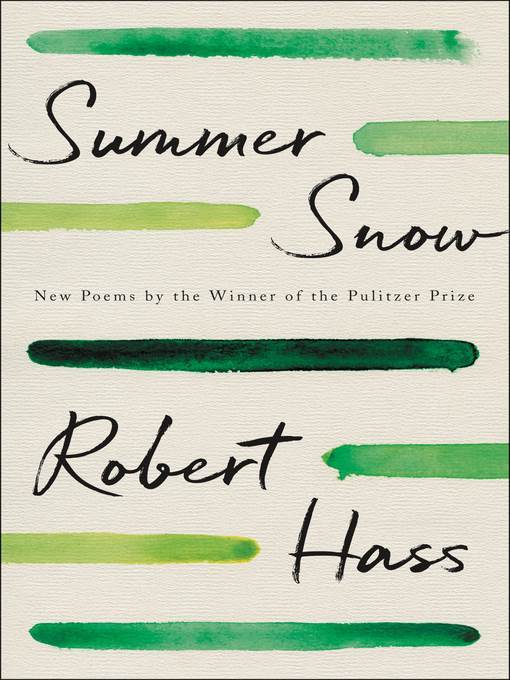
Summer Snow
New Poems
کتاب های مرتبط
- اطلاعات
- نقد و بررسی
- دیدگاه کاربران
نقد و بررسی

Starred review from October 21, 2019
In this ruminative, endlessly clever book, Pulitzer Prize–winner Hass (The Apple Trees at Olema) turns his eye toward nature, love, and even drone strikes, as, when chronicling a visit to a Las Vegas Air Force base for a protest, he juxtaposes the specter of commerce at a nearby casino with headlines detailing drone-related deaths in the Middle East. Though death may be the prevailing theme, these poems are far from dirges, as images of his Northern California environs shimmer with life: “you can almost hear the earth sigh/ As it sucks up the rain.” Hass experiments with form, vacillating between long and short lines, stanzas and long unbroken blocks of verse. His language is lofty but accessible, as in “The Archaeology of Plenty,” a loose, associative riff about finding meaning in a callous and capricious world, in which the poet argues for poetry as a cure for existential dread: “reach into your heavy waking,/ The metaphysical nausea that being in your life,/ With its bearing and its strife, its stiffs,/ Its stuff, seems to have produced in you,/ Reduced you to, and make something with a pleasing,/ Or teasing, ring to it.” Hass is a rarity, a poet’s poet and a reader’s poet who, with this newest endeavor, bestows a precious gift to his audience.

April 1, 2020
In "Patches of Snow in July," former U.S. Poet Laureate Hass sets up the image that is central to this poem and to the collection: "the way the white patches of snow in the saddles of bare rock between the/ massive peaks glittered in the sun undid me." As he remembers seeing leftover bits of melting snow in the Sierra Mountains, he associates the memory with various people who are no longer alive with the poem, then suggests how he was moved ("undone") by the persons he is elegizing. Nearly all of these poems refer to someone Hass has known personally or professionally, with one of the most evocative poems referring to his parents. Hass infuses his work with numerous references to nature, which tend to fill out the portrait of the deceased: "death's song is the color of wet violets." Although there are a few haikulike poems, most of the collection is composed of longer prose poems. VERDICT Overall, this collection of elegies has a pleasing, conversational tone (despite the morbidity of its subject), as if Hass is reading nature not to glean a message but to hear and see what nature has to say. For all libraries.--C. Diane Scharper, Johns Hopkins Univ., Baltimore, MD
Copyright 2020 Library Journal, LLC Used with permission.

Starred review from December 1, 2019
Former U.S. poet laureate and winner of the National Book Award and Pulitzer Prize, Hass presents his first collection in ten years, one that covers a rich landscape of human experiences. Early on in "Second Person"?a long narrative poem punctuated with lines like acceleration in the occasions for mourning ?time, geography, and daily interactions are shown to shape our directions and the trajectory of our thoughts. It is this intellectual momentum, combined with emotional precision, that is most astonishingly clear in Hass' new poems. The bright, glowing lyrics include "An Argument About Poetics Imagined at Squaw Valley After a Night Walk Under the Mountain," a surreal poetic cavalcade with an ironic first line: My friend Czeslaw Milosz disapproved of surrealism. In "Pertinent Divagations Toward an Ode to Inuit Carvers," the speaker engages in a dialogue with craft, maybe even with the ghost of poems and poets past, in lines that stick, such as: But this is a poem in praise of imperfection. Ultimately it is the imperfections in our world that Hass so gracefully catches, steadies, and illuminates in this powerful gathering.(Reprinted with permission of Booklist, copyright 2019, American Library Association.)

Starred review from April 19, 2021
Successful novelist Gerry Andersen, the protagonist of this delicious literary thriller from Edgar winner Lippman (Lady in the Lake), has moved to Baltimore from New York to be near his ailing mother. He has barely settled into his duplex penthouse when his mother dies. While mulling over his agent’s suggestion that he write a memoir and trying to overcome the rising fear that he’ll never write again, Gerry slips and falls down his dangerous (but artistically designed) staircase. His injuries are severe, and he’s confined to bed and cared for by round-the-clock nurses. Befuddled by painkillers, Gerry’s mind drifts back over episodes in his life: his childhood, the highs and lows of his three marriages, his book tours and teaching jobs. One night, he receives a phone call from a woman claiming to be Aubrey, a character in his first—and still royalty-producing—novel, Dream Girl. The calls persist, as do shadowy nighttime appearances of a woman. He scrambles to separate truth from possible hallucinations until the morning he awakes to find a woman undeniably dead in his bed. Perceptive, often amusing insights into a writer’s mind make this a standout. Lippman is in top form for this enticingly witty, multilayered guessing game. Agent: Vicky Bijur, Vicky Bijur Literary.

























دیدگاه کاربران